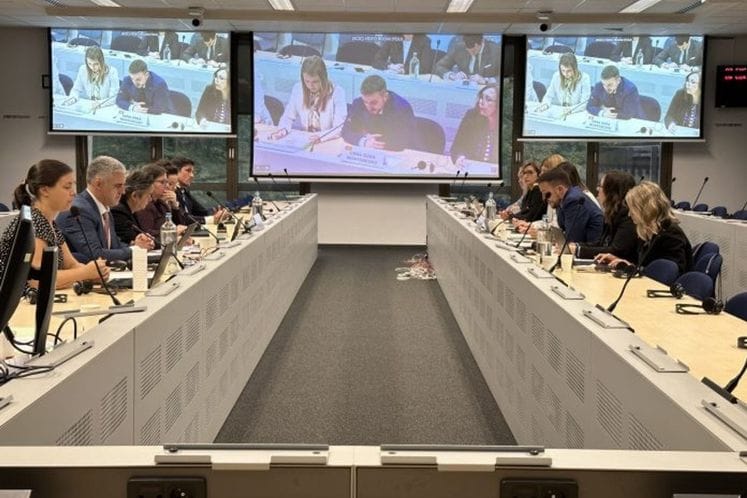- Government of Montenegro
Ministry of European Affairs Continue with reforms and harmonization of legisla...
Continue with reforms and harmonization of legislation

The 13th meeting of the Subcommittee on Innovation, Human Resources, Information Society and Social Policy was held in Brussels in a hybrid format within which were disused the results achieved at the level of the negotiation chapters 2 – Freedom of movement for workers, 10 – Information Society, 19 – Social policy and Employment, 25 – Science and Research and 26 – Education and Culture. On behalf of the European Commission, the co-chair, Deputy Head of Unit D2 for Montenegro and Serbia in the DG NEAR, Cindy van den Boogert, pointed out the opportunity for Montenegro in the current geopolitical context where EU enlargement is back high on the agenda. She invited to focus even more attention on the fulfillment of the closing benchmarks, and stated that the Commission expects Montenegro to improve and speed up the functioning of the education system, digitization in the field of social policy, improving the conditions for gender equality. She pointed out that European Commission President Van der Leyen had announced a New Growth Plan for the Western Balkans which will include four pillars: … of the single market, regional economic integration , accelerate fundamental reforms and increase of pre-accession funds. As part of the current political circumstances, the fact that the Government has not been formed yet and the Parliament has not been established was highlighted, and that the negotiation process should be completed as soon as possible so that Montenegro can focus more clearly on its priorities and to the closing of the remaining negotiation chapters.
The Head of the Mission of Montenegro to the EU, Ambassador Petar Marković in the introductory remarks pointed out that we, like the European Union, have shown resilience and unity in relation to the challenging circumstances we faced (the war in Ukraine, the reception of tens of thousands of Ukrainian refugees, the cyber-attacks on the Government’s critical infrastructure and the EU support in that segment). He added that the changed geopolitical landscape made it even more urgent to bring the Western Balkans closer to the EU, and that we are well aware of the messages coming from the EU officials about the right moment to speed up our efforts to integrate into the EU. He pointed out that the fulfillment of the final benchmarks is a priority for the Government when it comes to the open chapters within this Subcommittee, but Montenegro remains equally committed to implement relevant education and research policies, when it comes to the temporarily closed chapters, i.e. 25 and 26.
Co – Chair on behalf of Montenegro, the State Secretary in the Ministry of Labour and Social Welfare and the head of the negotiating working groups for the chapters 2 and 19, Edina Dešić, thanked the EC for its comprehensive support in the negotiation process, underlining that Montenegro, regardless of all the current political circumstances, is committed to the EU agenda. She also added that Montenegro is aware of the transformative power of the policies in the chapters in question, and that she believes that Montenegro will consistently continue work in order to fulfill the obligations from the EU agenda.
During the meeting, the activities carried with the aim to improve the functioning of the Employment Agency of Montenegro, in the part of the legislation and strategic framework related to the field of youth, sports, culture and foreigners in Montenegro and stressed out the implementation of S3 smart specialization and the establishment of a strong management system for this process were praised. The EC encourages Montenegro to continue efforts, in aligning with EU legislation and standards, among other to constantly improve the Labor Law, in particularly the Law on Protection and Equality and Prohibition of Discriminations, the Law on Higher Education, the Law on Scientific Research, the Law on Electronic Communication as well as the media laws in the context of the EU acquis.
